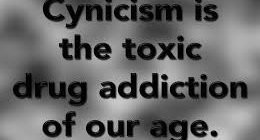It’s a thing. A nasty thing – that is easy to laugh along with but that in the longer term often erodes both bad and good aspects of the subject under critique.

Around here I ask questions of the church, mission and our interaction with the world around us (hence ‘backyard missionary’) and I admit – confess even that in days gone by my critique has had a slice of toxic cynicism in it. At times I have gone beyond the brief I gave myself to question, challenge and critique and at times I have just been sharp and destructive – albeit under the guise of questioning.
Quite honestly I am sorry for any damage that may have done to those who have also been questioning and critiquing but for whom peace hasn’t been found, but instead the whole faith aspect of life has been cast off either because the church wronged them or because some questions of faith couldn’t easily be reconciled.
If you’re wondering where these thoughts come from, I’ve been in the Gold Coast the last few days attending and speaking at the Exponential Church Planting Conference. I haven’t been to many conferences of late so it was interesting to be back in that space and reflecting on ways forward for the Australian church.
I met a lot of new people – which was inevitable, as I only knew 3 of the 600 who were attending. Some conversations were short and sharp, others longer and meaningful. One of the latter involved chatting to a couple who had recently closed their church plant after several years because, in their words, ‘it was no longer a community centred on Jesus.’ (Just as aside I wonder how many other churches would close if that criteria were applied with rigour…)
They shared a rather tragic story of planting with great hope, attracting a large number cynical and disaffected Christians / Ex-vangelicals and then walking with them as their faith wandered further and further from its centre. In the end it wasn’t a community centred on Jesus – it was a community of people who wanted to be good people in the world. A moment of clarity came for this couple when they surveyed their church on their hopes and dreams, their beliefs and their sense of commitment to the future. The results were devastating revealing that the majority of their church were really not committed to following Jesus and their questioning had led them further away from faith.
To their credit the couple closed the church – because it was no longer a church… It was a group of friends for whom an organised event had been scheduled and they would turn up and enjoy it (if they could.)
Curiously, there wasn’t massive disappointment at its closing – just some comments that of course they would all still hang out ‘organically’. Would it surprise you if I said that didn’t happen?
A community that began with such hope got tangled up, and self destructed. This was a really sad story to hear and I could feel the pain from this couple who started with such hope, only to finish up in such devastation. Certainly one of the hardest parts of my own experience leading churches for the last 30 odd years has been watching people say ‘yes’ to Jesus and then at some point later lose their way as they deconstructed their faith to a point where nothing was important – nothing was to die for.
But back to toxic cynicism – the kind of cynicism that moves towards destruction rather than towards faith and hope. You will know it when you feel it. It doesn’t ask questions that call for a deeper dive into our theology and ecclesiology. It just tears down, shames and despises the subject in question.
For example – church… Church is such an easy target and it isn’t hard to dislike some practices or be hurt by ‘the church’. How we deal with that is another thing.
It seems the word of our time is ‘deconstruction’, both of faith and of our understanding of church and how it operates. I have done my own fair share of deconstructing over the years. I have shifted ground significantly on some important theological concepts and at times I have simply had no answers whatsoever to disturbing questions. On occasions so I have then been forced to simply trust that God is good even when I can’t grasp what he is doing (or not doing.)
As well as doing my own re-thinking and pondering I have been keen to ensure that church is a place where questioning and doubting is welcomed. We are all gonna ask questions – we are all gonna review our theology from time to time so why not have a safe space to do it? Churches that don’t welcome questioners will generally create a brittle faith that does ok in happy times, but literally shatters when under duress.
So when does deconstruction become dangerous?
When it moves into cynicism, because the toxic cynicism is only a step away.
Deconstruction asks ‘tell me again, why do we meet like we do for church… Can we do this in other ways? Can we re-imagine this whole thing?!
Cynicism snipes and growls – ‘church?! Yeah right… I’m so over it – same stuff every single week and that guy is so deadly boring!’
Toxic cynicism takes it one step further. It says ‘hey church sux right? Let’s just catch up, but let’s no have meaningless prayers, lame singing or preaching that assumes there is one ‘right’ way to look at something.’
And it really becomes dangerous when it allowed to be the dominant culture of the group. When toxic cynicism is allowed to rule the show unchecked, then faith has a hard time surviving. I know we all have times of cynicism and frustration with the church, but if we lead with this it can be utterly devastating. When this is our primary MO then it also becomes tiresome to be around. It ‘white ants’ faith, both of the cynic and of those around him or her.
To move back a step, I’m not afraid of helping people deconstuct – in fact I think its an important stage of faith (see James Fowler for more on this) but ‘deconstructing’ is about dismantling unhelpful paradigms and opening new ways of seeing things. Take Father Christmas as an example – sooner or later we have to deconstruct that belief and the whole myth that goes with him. Maturity requires it. In the same way faith matures and toughens as it encounters questions, doubts and challenges and moves thru them.
For those of us who are leaders, the great challenge is to know how to create a safe space for doubt and questioning without simply facilitating a group deconstruction and abandonment of faith. It means being strong on some things and choosing not to negotiate or question – even when we are unable to fully explain a question ourselves. It means holding our own inner cynic in check when it would be easier to snipe and sneer. I feel like this has been one of my own practices in over the last few years. I can enmpathise with people’s questions and doubts without needing to affirm them with a cynical ‘oh yeah, tell me about it…’
Deconstruction isn’t going to go away. Unless we lose all connectivity to the world around us, we are now permanently exposed to people who ask questions like we do, and if we use google to seek out the answers then that algorithm will feed us with more doubt and will lead us further down the rabbit hole of toxic cynicism. So if we can expect deconstruction to continue to be a thing in the days ahead, what might we do to help people keep going with the faith journey?
Build a strong foundation – Build it on core essentials of the faith. Keep circling back to Jesus, the things he taught, the things he did and the significance of the resurrection.
Keep questions on the radar – so that we are always acknowledging mystery and paradox – I wonder if sometimes people get knee deep in faith only to discover that the water they are soon to be swimming in is murky and unclear at times. If we can negate the element of surprise and disappointment by acknowledging it early then I feel like we might do a better job of dealing with doubt. It will happen. We will ask questions together, but we will hold as not negotiable that God is good and that Jesus is our living picture of what he is like.
Hold your theological ground – there are plenty of issues that I see as unclear in scripture – which is why we have so many denominations. But you will have some core convictions that you simply can’t negotiate on. For example the bodily resurrection is one of the central points of faith, whereas the ‘shape of creation’ is much more up for grabs.
Don’t be afraid to nail your colours to the mast on stuff that matters and allow those who want to leave to leave.
And if you’re reading this as a cynic then please heed the warning that you could just be a step away from being a spiteful, sneering toxic cynic. Maybe better to deal with the source of your cynicism and just be aware that it is present in your make-up.
So by all means ask difficult questions, seek more satisfactory answers, but when you get to a place of mystery and bewilderment choose to pray for faith to move forward rather than allowing toxic cynicism to win the day.








